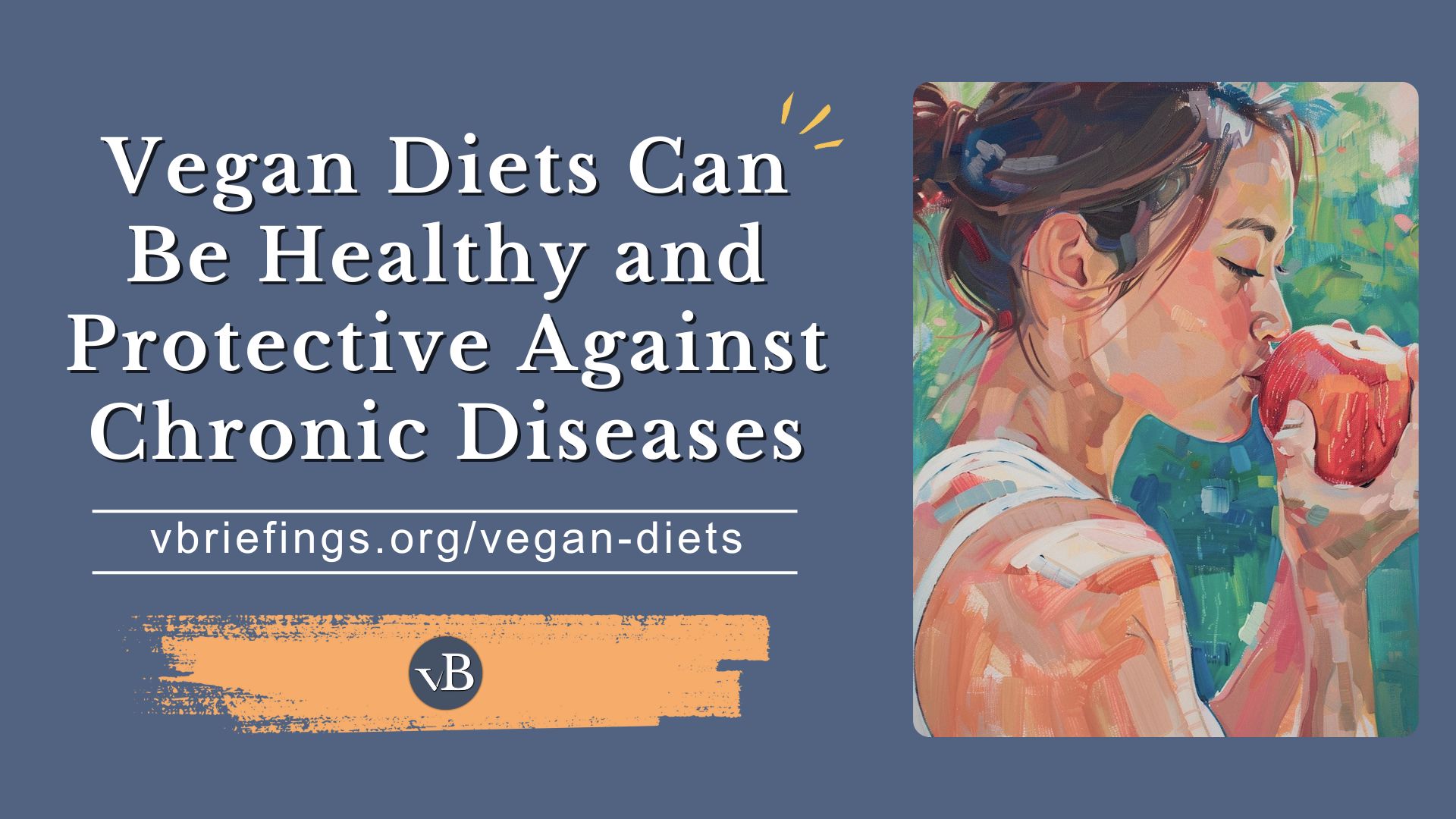Preface
Briefing description and more.
There is agreement among the credentialed dietetic and medical communities that we do not need animal products to be healthy, and that vegan diets are health-promoting and protective against chronic diseases.
Companion Videos
How to use companion videos
Videos may be posted on multiple social media platforms, and you can share them on each platform according each platform’s conventions.
Share this Briefing
Social Media Sharing Image
This image will be used when sharing the briefing on a social media platform. You can see all social sharing images in the grid view.

How to share this briefing
Click on the icon for the platform on which you wish to share. What happens next depends on the platform, but generally a popup will appear, letting you add your own text as you share.
Briefing Meta
Metrics
Note: we will publish additional briefings after completing flashcards and presentation slides for selected briefings.
Counts:
| Main Text | |
| Key Points | 5 |
| Counterclaims | 2 |
| Supplementary | 2 |
| Further Study | 4 |
| Footnotes | 41 |
| Media & Advocacy | |
| Advocacy Notes | 10 |
| —Socratic Questions | 9 |
| Flashcards | 53 |
| Presentation Slides | 0 |
| Memes & Infographics | 0 |
| Companion Videos | 0 |
Other Meta:
Date Posted:
Last Edited:
Edit Log:
Key Points Links
Loading…
Help Us Improve
Please send your suggestions for improvements, or report any issues with this briefing to team@vbriefings.org
We appreciate that you are taking the time to help up improve. All suggestions and reports will be carefully considered.
Summary
A concise summary of the briefing (see below for citations).
Leading health organizations, including Harvard Health, Mayo Clinic, Cleveland Clinic, Kaiser Permanente, and NewYork-Presbyterian, endorse plant-based diets as healthy and effective against heart disease, diabetes, high blood pressure, obesity, high cholesterol, and other conditions. Kaiser Permanente advises doctors to recommend plant-based diets, and Cleveland Clinic affirms they have no disadvantages. Major dietetic associations, including the Academy of Nutrition and Dietetics, state that vegan diets can be healthy. Even the USDA, despite its ties to animal agriculture, recognizes that vegan diets are healthy, confirming that all essential nutrients can be obtained without animal products.
Context
Places this topic in its larger context.
For veganism to be considered valid, it’s not required to prove that a vegan diet is superior, only that it is sufficient for good health. Demonstrating the benefits of a vegan diet can support its viability, which is why we explore some of those benefits here.
However unlikely, if future research were to reveal that a required nutrient could only be sourced from animals, veganism would remain valid. In such a scenario, we would have a moral duty to consume only the necessary animal products in the smallest necessary quantity and acquire them in the least harmful way.
Key Points
This section provides talking points.
Prominent health organizations embrace a vegan diet.
Harvard Health,1 Mayo Clinic,2 Cleveland Clinic,3 Kaiser Permanente,4 and NewYork-Presbyterian Healthcare,5 all say that a plant-based diet is healthy.
- Harvard Health said, “Nowadays, plant-based eating is recognized as not only nutritionally sufficient but also as a way to reduce the risk for many chronic illnesses.”6
- Mayo Clinic said, “A well-planned vegetarian [explicitly defined to include a vegan diet] diet is a healthy way to meet your nutritional needs.”7
- Cleveland Clinic said, “There really are no disadvantages to a herbivorous diet!” and “Obtaining proper nutrients from non-animal sources is simple for the modern herbivore.8
- Kaiser Permanente said “Healthy eating may be best achieved with a plant-based diet, which we define as a regimen that encourages whole, plant-based foods and discourages meats, dairy products, and eggs as well as all refined and processed foods.9
- NewYork-Presbyterian Healthcare said, “Plant-based diets are believed to be an effective means of treating chronic disease, including diabetes.”10
These organizations also acknowledge the ability of a plant-based diet to fight health issues such as heart disease, diabetes, high blood pressure, obesity, and high cholesterol.11121314
Kaiser Permanente even advises their doctors to recommend a plant-based diet to their patients, especially those with high blood pressure, diabetes, cardiovascular disease, or obesity.15
Dietetic associations endorse a vegan diet.
The endorsement of totally vegan diets by dietetic associations has maximum credibility because human nutrition is their primary concern and the focus of their research.
The Academy of Nutrition and Dietetics (United States),16 the British Dietetic Association,17 the Dietitians of Canada,18 and the Dietitians Association of Australia,19 have all made pronouncements on the viability of a vegan diet.
The 2025 Academy of Nutrition and Dietetics formal position statement endorses well-planned vegan diets as healthy and nutritionally adequate for adults, and said that “…vegan dietary patterns can be recommended by RDNs [Registered Dietitian Nutritionists], when appropriate, for prevention and management of some chronic diseases…”20
- Note: The Academy of Nutrition and Dietetics is the largest global organization of food and dietetics practitioners, comprising more than 100,000 certified professionals.21
The U.S. government said a vegan diet is healthy.
- In its dietary guidelines, the United States Department of Agriculture (USDA) acknowledged that a vegan diet is a healthy eating pattern. It acknowledged this in its discussion of Vegetarian Eating.22
- This is particularly telling since the USDA is a strong supporter of animal agriculture, providing billions annually in subsidies.23
Various plant-based initiatives have shown excellent results.
The PlantPure Nation Initiative
PlantPure Nation is a movie documenting a community health initiative.24
- Note: At the time of writing, the PlantPure Nation documentary video can be watched free on Tubi and Amazon Prime Video, and is also available for rent or purchase on Amazon Video, Google Play Movies, YouTube, and Apple.
This initiative ran pilot programs, called pods, in rural communities where participants were provided veganized versions of traditional recipes for 10 days, including lasagna, spaghetti, vegan meatballs, veggie burgers, etc… Participants received lab tests before and after the 10 days.
In just 10 days, participants experienced significant improvements in key health markers, such as reductions in cholesterol levels, blood pressure, blood sugar, triglycerides, and body weight. Many reported better energy levels and a decrease in reliance on medications.
Michael McEntee of Impact Health, the biometric tester, said “I’ve been testing for 26 years, we’ve tested millions of people, and I’ve never seen results like this.”
One participant, whose results were not unusual, expressed disbelief on being told his results: his cholesterol went from 277 to 150 and triglycerides went from 395 to 98, all in less than two weeks.
The Ornish Reversal Program
The Dean Ornish Reversal Program, is a comprehensive lifestyle intervention designed to reverse heart disease,25 the number one cause of death in the United States.26
It is the only program scientifically proven in randomized controlled trials to reverse the progression of even severe coronary heart disease without drugs or surgery.27
Key components of this whole food, plant-based diet are that it is naturally low in fat and refined carbohydrates, and benefits from stress management, exercise, and social support lifestyle changes.28
The program has been implemented in numerous hospitals29 and is approved by Medicare.30
Caldwell Esselstyn: Heart Disease Prevention and Reversal
Dr. Caldwell Esselstyn’s book Prevent and Reverse Heart Disease: The Revolutionary, Scientifically Proven, Nutrition-Based Cure presents a compelling argument for the power of a plant-based diet in combating heart disease.31
The book draws on the results of Dr. Esselstyn’s nutritional study, which demonstrated that a plant-based diet can prevent, stop, and even reverse heart disease.32
The images of angiograms in the book provide visual evidence of the diet’s effectiveness. The “before” images show coronary arteries narrowed by plaque buildup, while the “after” images, taken after patients followed a plant-based diet, reveal widened arteries with reduced plaque and improved blood flow.33
The original 199534 study was criticized because of its patient population size of 22, so he conducted another study in 2014 with 198 patients. The larger study showed virtually the same results.35
All essential nutrients can be obtained without consuming animal products.
- Even though certain vested interests have insinuated that certain nutrients must come from the animal kingdom, there is no convincing evidence to support this.
- If such evidence existed, the organizations mentioned could not have endorsed and praised a vegan diet.
- It is impossible to name even one required nutrient that must come from animals.
Counterclaims
Responses to some yes but retorts.
Claim: Some vegans are unhealthy.
Just as there are individuals who follow an unhealthy diet while consuming animal products, there are also vegans who make poor nutritional choices.
The existence of unhealthy individuals within any dietary pattern does not inherently render that diet unhealthy as a whole. Some health problems are genetic and have nothing to do with any dietary pattern.
The issue of poor nutrition is a broader concern, emphasizing the need for education and awareness about healthy eating. Americans are commonly deficient in nine nutrients, according to the US Office of Disease Prevention and Health Promotion (ODPHP).36
Claim: A vegan diet is not for everyone; it made me sick.
This more specific claim is addressed in a separate briefing, which highlights the potential challenges of a vegan diet and suggests ways to address them.
Supplementary Info
Additional information that may prove useful.
Quotes and Paraphrases from Medical Professionals
Dr. Walter Willet, past chair of Harvard’s Department of Nutrition; current professor
- Dr. Willett said that for the sake of future generations, we should move toward a vegan diet—which benefits both the planet and our health.37
More on Dr. Willet and the quote
About Dr Willet (summarized from Wikipedia)38:
- Physician and nutrition researcher, born in 1945
- Professor of Epidemiology and Nutrition at the Harvard School of Public Health,
- Past chair of Harvard’s Department of Nutrition (26 years served)
- Also a professor of medicine at Harvard Medical School
- Published over 2,000 scientific articles on diet and disease
- Principal investigator of the second Nurses’ Health Study (NHS2 or NHS II)
- Author of Eat, Drink, and Be Healthy (2001) [subtitled as “The Harvard Medical School Guide to Healthy Eating.”]
- Called by an article in The Boston Globe the “world’s most influential nutritionist”.
- In 2016, Dr. Willett was named one of the ten most influential biomedical researchers by the Semantic Scholar AI program.
Exact quote, as reported by Harvard School of Public Health:
- “I think if we really care about the world our children and grandchildren will inherit, we do need to shift toward [a vegan diet],” said Willett. “And the good news is that it’s not just our planet that will be more healthy, but we will be more healthy as well.”39
Dr. Kim Williams, past president of the American College of Cardiology, advises his patients to go vegan40 and said that…
“There are two kinds of cardiologists: vegans and those who haven’t read the data.”41
Further Study
Sources providing a deeper understanding of the topic or related topics.
Other Resources
VeganHealth.org is a comprehensive online resource dedicated to providing evidence-based nutritional information for individuals following a vegan diet, maintained by registered dietitian Jack Norris. Get started with his nutrition tips for vegans.
The comprehensive edition of Brenda Davis’s book Becoming Vegan provides an exhaustive treatment of vegan nutrition.
Sentient‘s article “Plant-Based Diets Boast Many Health Claims, but What Does the Science Show?” takes care not to overstate health claims.
Advocacy Resources
Information to help with outreach and advocacy.
Note: we will publish additional briefings after completing flashcards and presentation slides for selected briefings.
Share This Briefing
Cloned from the Preface Section on page load.
Companion Videos
Cloned from the Preface Section on page load.
Memes and Infographics
No images found.
How to use Memes and Infographics
To sequence through all memes and infographics on this page, click on any image than use the arrow keys or the arrow buttons to show next and previous images.
To share a meme or infographic, right click on the image and choose download or save as. Then upload the image to the platform of choice.
Presentation Slides
Slides not available.
How to Use the Presentation Slides
You can view the slideshow full screen by clicking on the first link above.
To use Canva presenter mode, view the speaker notes, or download the slides as PowerPoint, login to Canva (the free account works) and follow the Full Canva Link provided above.
To copy this presentation to your own Canva project, use the Full Canva Link provided above, then select File->Make a Copy from the upper left. You can build your own unique presentation from multiple briefings by copying the presentation from each briefing and then building another presentation from the copied presentations.
Flash Cards
We partner with Brainscape because of their excellent features for learning. You will need to create a free Brainscape account to study the cards.
Go to Flash Cards: This will take you to a list of decks.
About Flash Cards and Brainscape
Flash cards are here to help you commit important facts and concepts in this briefing to memory.
In Brainscape, there is one deck for each briefing. You can study more than one deck at a time. Brainscape uses spaced repetition to promote memory retention. It is “the secret to learning more while studying less.”
You can study using your browser, but Brainscape also has a free mobile app that makes learning anywhere easy.
Socratic Questions
Socratic-style questions are embedded in the Advocacy Notes below, and shown in italics.
These are open-ended, thought-provoking questions designed to encourage critical thinking, self-reflection, and deeper understanding. They are inspired by the Socratic method, a teaching technique attributed to the ancient Greek philosopher Socrates, who would ask his students probing questions rather than directly providing answers.
The goal is to help people examine their beliefs, clarify their thoughts, uncover assumptions, and explore the evidence and reasoning behind their ideas.
Advocacy Notes
Tips for Advocacy and Outreach
General Tips
When engaging in a general conversation to promote veganism and animal rights, consider starting by asking whether the person believes vegan diets can be healthy. If they respond positively, you can transition to discussing ethical considerations without spending additional time on the health aspect.
However, if they respond negatively, they may be using the belief that vegan diets are unhealthy as a justification for supporting practices that contribute to animal cruelty. In this case, you can address their concerns by sharing information that challenges this misconception, as outlined in the summary. Once you help them move past this barrier, you can shift the conversation to focus on the ethics of exploiting animals.
If you need to converse on the topic of vegan diets in greater detail, the information in the Supplementary Info section can be highly persuasive. This content was included because the author of this briefing found it to be particularly effective based on their personal experience.
Avoid getting caught up in the intricate details of studies, which takes you off-message. Instead, rely on expert testimony from well-respected and authoritative sources, such as the Mayo Clinic and the Academy of Nutrition and Dietetics.
- Note: referencing respected institutions or experts like the Mayo Clinic and the Academy of Nutrition and Dietetics is not an example of the appeal to authority fallacy; rather, it is an appeal to legitimate expertise.
Your goal isn’t just to list nutrients and studies but to challenge their assumptions and show that plant-based diets are not only sufficient but often superior for long-term health.
Segue the Conversation Back to Animal Ethics
People often discuss vegan diets in terms of nutrition, convenience, or personal preference, rather than ethics. While these topics matter, bring the discussion back to the ethical reasons for being vegan as soon as you can.
- “Since we can thrive on a plant-based diet, what ethical justification remains for continuing to support industries that harm animals?”
- “If someone said they couldn’t go vegan because it’s inconvenient, would that really justify causing unnecessary suffering?””
- Are we talking about nutrition because we truly think vegan diets are deficient, or because it’s an easy way to avoid the ethical issue of animal suffering?”
Why? This keeps the focus on ethics instead of letting them use this argument as a distraction.
Use Trust in Respected Health Organizations
Most people place at least some degree of trust in credentialed professionals and health institutions, compared to trust in influencers.
- “Harvard, the Mayo Clinic, Cleveland Clinic, and Kaiser Permanente all say a well-planned vegan diet is healthy and helps prevent disease. Do you think they would endorse it if it were dangerous?”
- Kaiser Permanente advises its doctors to recommend plant-based diets, and the Cleveland Clinic says they have no disadvantages. Why would they do that if vegan diets were unhealthy?”
Why? This shifts the conversation away from opinion and toward expert consensus.
Challenge the Idea That Animal Products Are Necessary
People often assume that certain nutrients must come from animals—show them that’s not true.
- “Can you name one essential nutrient that we can only get from animal products? Because no health organization has been able to.”
- “The USDA, which heavily supports animal agriculture, still acknowledges that a vegan diet is healthy. If there were a required nutrient missing, wouldn’t they say so?”
Why? This forces them to rethink their reliance on animal products for nutrients.
Address the “But Some Vegans Are Unhealthy” Argument
People love to bring up anecdotal evidence of unhealthy vegans. Counter it by showing that any diet can be unhealthy if done wrong.
- “If someone eats too much junk food isn’t that a nutrition problem and not a vegan problem?”
- “There are unhealthy vegans just like there are unhealthy meat-eaters, but would you say an omnivorous diet is unhealthy because some people don’t pay attention to nutrition?”
Why? This shuts down anecdotal evidence and brings the focus back to science.
Academy of Nutrition and Dietetics Position Paper Update
In February 2025, the Academy of Nutrition and Dietetics released a new position paper42 replacing the 2016 paper43.
The new paper applies only to adults, and removes the wording that a vegan diet is appropriate “for all stages of the life cycle, including pregnancy, lactation, infancy, childhood, adolescence, older adulthood, and for athletes.”
We anticipate another paper covering non-adults may be forthcoming.
Footnotes
Our sources, with links back to where they are used.
- “Becoming a Vegetarian.” Harvard Health Publishing, Harvard Medical School. April 15, 2020. ↩︎
- Vegetarian Diet: How to Get the Best Nutrition.” Mayo Clinic. March 14, 2016 ↩︎
- Understanding Vegetarianism & Heart Health” Cleveland Clinic, December 2013. ↩︎
- Phillip J Tuso, MD, Mohamed H Ismail, MD, Benjamin P Ha, MD, and Carole Bartolotto, MD, RD. “Nutritional Update for Physicians: Plant-Based Diets.” The Permanente Journal – The Permanente Press – Kaiser Permanente – Permanente Medical Groups, 2013. ↩︎
- Ask A Nutritionist: Plant-Based Diets.” NewYork-Presbyterian, March 30, 2017. ↩︎
- “Becoming a Vegetarian.” Harvard Health Publishing, Harvard Medical School. April 15, 2020. ↩︎
- Vegetarian Diet: How to Get the Best Nutrition.” Mayo Clinic. March 14, 2016 ↩︎
- Understanding Vegetarianism & Heart Health” Cleveland Clinic, December 2013. ↩︎
- Phillip J Tuso, MD, Mohamed H Ismail, MD, Benjamin P Ha, MD, and Carole Bartolotto, MD, RD. “Nutritional Update for Physicians: Plant-Based Diets.” The Permanente Journal – The Permanente Press – Kaiser Permanente – Permanente Medical Groups, 2013. ↩︎
- Ask A Nutritionist: Plant-Based Diets.” NewYork-Presbyterian, March 30, 2017. ↩︎
- Becoming a Vegetarian.” Harvard Health Publications Harvard Medical School, March 18, 2016. ↩︎
- Phillip J Tuso, MD, Mohamed H Ismail, MD, Benjamin P Ha, MD, and Carole Bartolotto, MD, RD. “Nutritional Update for Physicians: Plant-Based Diets.” The Permanente Journal – The Permanente Press – Kaiser Permanente – Permanente Medical Groups, 2013. ↩︎
- Ask A Nutritionist: Plant-Based Diets.” NewYork-Presbyterian, March 30, 2017. ↩︎
- Understanding Vegetarianism & Heart Health” Cleveland Clinic, December 2013. ↩︎
- Phillip J Tuso, MD, Mohamed H Ismail, MD, Benjamin P Ha, MD, and Carole Bartolotto, MD, RD. “Nutritional Update for Physicians: Plant-Based Diets.” The Permanente Journal – The Permanente Press – Kaiser Permanente – Permanente Medical Groups, 2013. ↩︎
- Raj, Sudha, et al. “Vegetarian Dietary Patterns for Adults: A Position of the Academy of Nutrition and Dietetics.” PDF. Journal of the Academy of Nutrition and Dietetics, 7 Feb. 2025. ↩︎
- British Dietetic Association.” The Vegan Society. Accessed August 3, 2017. ↩︎
- Healthy Eating Guidelines for Vegans.” Dietitians of Canada, November 2017. ↩︎
- Vegan Diets: Everything You Need to Know – Dietitians Association of Australia.” Dietitians Association of Australia. Accessed August 3, 2017. ↩︎
- Raj, Sudha, et al. “Vegetarian Dietary Patterns for Adults: A Position of the Academy of Nutrition and Dietetics.” PDF. Journal of the Academy of Nutrition and Dietetics, 7 Feb. 2025. ↩︎
- “Join Academy of Nutrition & Dietetics | Indiana Academy of Nutrition & Dietetics.” Indiana Academy of Nutrition & Dietetics |, 17 Aug. 2020. Accessed 23 Feb. 2025. ↩︎
- USDA Food Patterns: Healthy Vegetarian Eating Pattern.” Dietary Guidelines for Americans, Eighth Edition. Accessed August 4, 2017. ↩︎
- Hayes, Jared. “USDA Livestock Subsidies Top $59 Billion | Environmental Working Group.” Www.ewg.org, 30 Aug. 2023. ↩︎
- The PlantPure Nation documentary video can be watched free on Tubi and Amazon Prime Video, and is also available for rent or purchase on Amazon Video, Google Play Movies, YouTube, and Apple. ↩︎
- Ornish, Dean. “Ornish Reversal Program.” Ornish Lifestyle Medicine, ↩︎
- CDC. “Leading Causes of Death.” Centers for Disease Control and Prevention, 2 May 2024. ↩︎
- UCLA Health. Scientifically Proven Research for the Dr. Dean Ornish Program for Reversing Heart Disease. ↩︎
- Ornish, Dean. “Ornish Reversal Program.” Ornish Lifestyle Medicine. ↩︎
- Ornish, Dean. “Ornish Reversal Program.” Ornish Lifestyle Medicine. ↩︎
- “Intensive Cardiac Rehabilitation (ICR) Programs | CMS.” Cms.gov, 2014. Accessed 12 Aug. 2024. ↩︎
- Caldwell B Esselstyn, Jr. Prevent and Reverse Heart Disease: The Revolutionary, Scientifically Proven, Nutrition-Based Cure. New York, Avery, A Member Of Penguin Group (USA) Inc, 2008. ↩︎
- Caldwell B Esselstyn, Jr. Prevent and Reverse Heart Disease: The Revolutionary, Scientifically Proven, Nutrition-Based Cure. New York, Avery, A Member Of Penguin Group (USA) Inc, 2008. ↩︎
- Caldwell Esselstyn, Caldwell. Dr. Esselstyn’s Story – Esselstyn Foundation. ↩︎
- Esselstyn CB Jr, Ellis SG, Medendorp SV, Crowe TD. A strategy to arrest and reverse coronary artery disease: a 5-year longitudinal study of a single physician’s practice. J Fam Pract. 1995 Dec;41(6):560-8. PMID: 7500065. ↩︎
- Esselstyn CB Jr, Gendy G, Doyle J, Golubic M, Roizen MF. A way to reverse CAD? The Journal of Family Practice. 2014 Jul;63(7):356-364b. PMID: 25198208. ↩︎
- “Scientific Report of the 2015 Dietary Guidelines Advisory Committee, Part D Chapter 1.” Health.gov ODPHP, 2015. ↩︎
- Harvard T.H. Chan School of Public Health, “Vegan diet can benefit both health and the environment“, In the New, 2019, Accessed July 31, 2024 ↩︎
- Wikipedia Contributors. “Walter Willett.” Wikipedia, Wikimedia Foundation, 15 Aug. 2024, en.wikipedia.org/wiki/Walter_Willett. ↩︎
- Harvard T.H. Chan School of Public Health, “Vegan diet can benefit both health and the environment“, In the New, 2019, Accessed July 31, 2024 ↩︎
- O’Connor, Anahad. “Advice From a Vegan Cardiologist.” New York Times: Well (blog), August 6, 2014. https://well.blogs.nytimes.com/2014/08/06/advice-from-a-vegan-cardiologist/ ↩︎
- “Cardiologist Kim Williams, M.D. Wants To Eradicate Heart Disease.” Rich Roll, November 5, 2017. http://www.richroll.com/podcast/kim-williams/ ↩︎
- Raj, Sudha, et al. “Vegetarian Dietary Patterns for Adults: A Position of the Academy of Nutrition and Dietetics.” PDF. Journal of the Academy of Nutrition and Dietetics, 7 Feb. 2025. ↩︎
- Vegetarian Diets.” Academy of Nutrition and Dietetics. PDF December 2016. ↩︎




